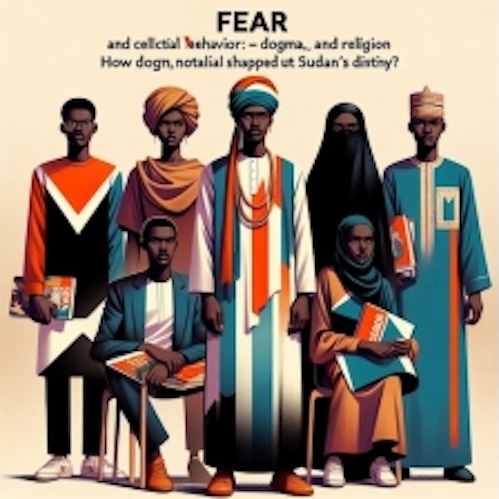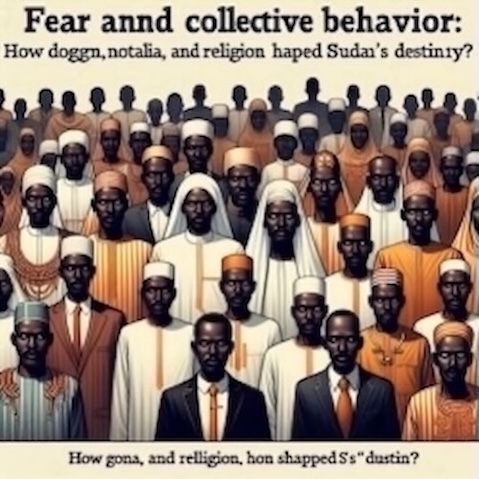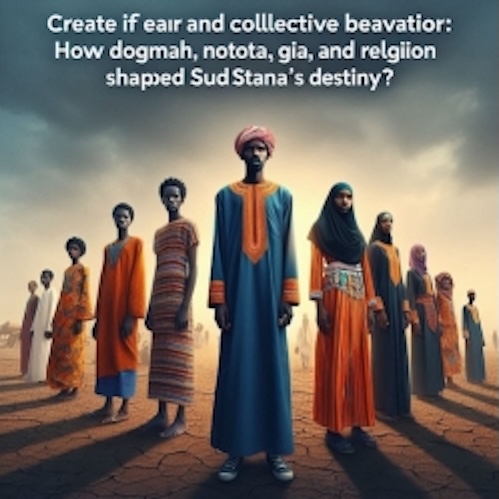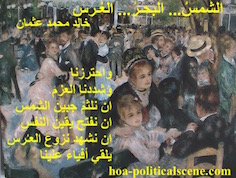Fear and Collective Behavior!
Fear and Collective Behavior highlights the psychological impacts of fear in Sudan. Yet, its message echoes far beyond Sudan’s borders. Across the globe, fear is not just an emotion... it’s a force that can paralyze progress, fracture societies, and feed cycles of violence. As you read this section, understand that we are not speaking about a distant issue. We are living through a time of escalating tensions, where international conflicts are mounting with alarming speed, and the threat of global warfare no longer feels like fiction... it feels possible.
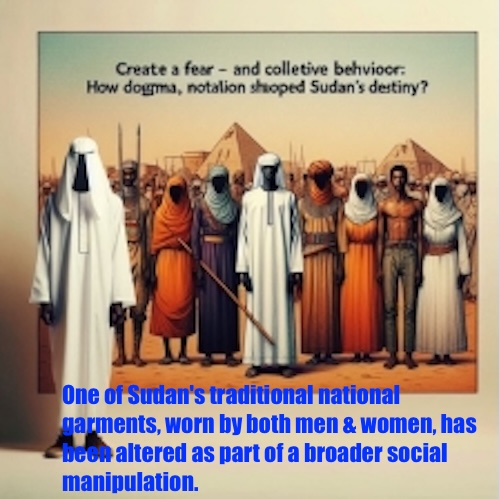 Fear and Collective Behavior: How Dogma, Nostalgia, and Religion Shaped Sudan’s Destiny?: One of Sudan's traditional national garments, worn by both men and women, has been altered as part of a broader social manipulation. The Muslim Brotherhood, later known as the National Islamic Front, has deliberately worked to reshape Sudanese identity, eroding its cultural heritage. Sadly, many Sudanese people remain unaware of this influence, which has contributed to the fragmentation of a land that once spanned one million square miles, the largest in Africa. It is a tragic loss, highlighting the need for greater awareness and appreciation of Sudan's true values.
Fear and Collective Behavior: How Dogma, Nostalgia, and Religion Shaped Sudan’s Destiny?: One of Sudan's traditional national garments, worn by both men and women, has been altered as part of a broader social manipulation. The Muslim Brotherhood, later known as the National Islamic Front, has deliberately worked to reshape Sudanese identity, eroding its cultural heritage. Sadly, many Sudanese people remain unaware of this influence, which has contributed to the fragmentation of a land that once spanned one million square miles, the largest in Africa. It is a tragic loss, highlighting the need for greater awareness and appreciation of Sudan's true values.This context is not abstract. It is now. Fear is being weaponized. Trust between nations is crumbling. You, as a global citizen and a vital agent of change, carry the power and the responsibility to see through the noise, to challenge political recklessness, and to foster reason when fear turns governments and people against one another. What has happened in Sudan is not isolated. It is a warning. And in recognizing it, we may still have time to prevent its echoes from becoming tomorrow’s headlines elsewhere.
This page belongs to a section that explores the psychology of fear and social behavior, using Sudan as a central case study. This section is derived from a broader analysis of conventional narratives, which in turn is rooted in the study of historical eras and their influence on modern discourse:
- How Fear Devastated an Entire Country? (Part #1)
- Sudan as a Modern Case Study of Fear-Driven Collapse! (Part #2)
- Fear and Collective Behavior: How Dogma, Nostalgia, and Religion Shaped Sudan’s Destiny? (Part #3)
- Reimagining Progress: How to Overcome Fear on Personal and Collective Levels? (Part #4)
- The Anatomy of Fear: Lessons from Sudan and the Psychology of Change! (Part #5)
So, this section is originated from another section about conventional narratives, which contains the following pages:
- Breaking the Illusion of Truth: Psychological Liberation & Intellectual Growth!
- Conventional Narratives Are Always Wrong
- Dominant Perspectives Shape Our World!
- Established Frameworks Invisible Forces!
- How Established Opinions Shape Perception?
- Illusions of Institutional Narratives!
- Mainstream Ideologies Shape History!
- Media Driven Fear Narratives!
- Origins of Misleading Narratives!
- Prevailing Discourses Challenge Social Narratives!
- Social Norms Shape Consumer Behavior!
- Why Prevailing Perspectives Fail Us?
The conventional narrative section is generated from a section about the historical eras, which includes:
- Why Expanding Horn Africa to Include Other States and Global Impacts?
- A New Era of Chaos and Distrust is Shaping!
- Pre-Cold War Era of Colonialism & Imperial Rivalries!
- Pre-Cold War American Expansionism!
- The Cold War Era: A Battle of Ideologies and Influence!
- Why Do Nations Fragment When Unity is Their Greatest Strength?
- Eastern Europe Socialist Bloc Fragmentation!
- Sudan and U.S. Policy: A Terrorism Connection? What's The Real Story?
- Eritrea Was Too Late to Independence Due to Colonial Conspiracies!
- Namibian Road to Independence From Liberation to Sovereignty!
- The Post-Cold War Era: A Shifting Global Landscape!
- How Economics, Ideology, and Geopolitics Fragment Nations and Create New Ones?
- New World Order: Stability or Chaos?
- Why Am I Saying A New Era of Disorder and Doubts is Shaping?
- Rewriting History: The Lies We Inherit!
- Illusion of Institutional Narratives!
- Why Prevailing Perspectives Fail Us?
- Conventional Narratives Are Always Wrong!
- Rewriting History: The Lies We Inherit!
You can explore all of these pages at the section of the Global Dynamics on this page.
Fear and Collective Behavior: How Dogma, Nostalgia, and Religion Shaped Sudan’s Destiny?
When a society stands at the threshold of transformation, individual fear becomes collective caution and collective caution, if unchallenged, calcifies into national paralysis. In Sudan, the fear of change was not just a private feeling. It became a public doctrine, reinforced by generational inertia, manipulated through religion, and sustained by a longing for the past. This article explores how collective psychology not just isolated decisions contributed to the collapse of a revolution.
1. Dogma as a Collective Defense Mechanism
Dogmatism thrives when people prefer certainty over truth. In Sudan, many clung to inherited worldviews not out of conviction, but because change required too much unlearning.
- Religious dogma resisted secular ideas not because they were flawed, but because they were unfamiliar.
- Cultural dogma insisted that only the elders had wisdom, ignoring the innovation, energy, and clarity of youth.
- Even among the politically neutral, dogmatic thinking meant dismissing new voices out of reflex.
Dogma gave people psychological safety in a chaotic world. But that safety came at the price of national growth.
2. Nostalgia as a Psychological Barrier
Nostalgia is comforting, but it can be deadly when it idealizes a past that never truly worked.
In Sudan, many equated "the old ways" with stability even as the system continued to fail.
- Elder generations feared their own irrelevance and clung to outdated norms.
- Others romanticized family and tribal structures, refusing to support state reforms that would challenge them.
- This longing for the past created resistance to innovation and political restructuring.
The result? A country built for yesterday could not face today.
3. Religion: From Faith to Fear Factory
Religion, in its true form, uplifts. But when entangled with state power, it can become an instrument of control.
- Sectarian political parties used religious language to frame secularism as an existential threat and feudality.
- Many feared that change would strip them of moral identity... an anxiety carefully cultivated over generations.
- Religious institutions subtly positioned themselves as the guardians of tradition and national purity.
By conflating belief with obedience, authorities created a culture in which questioning power became tantamount to blasphemy.
4. The Psychology of the Crowd: Why Action Falters?
Even when a revolution has clarity, collective psychology can corrode momentum:
- Fear of social rejection kept many from challenging their elders or parties.
- Spiral of silence, a phenomenon where people with dissenting views remain quiet because they believe they’re alone, stalled radical ideas.
- Pluralistic ignorance led people to underestimate how many others also feared the regime, making mass resistance feel riskier than it was.
This isn’t weakness... it’s psychology. And when leaders fail to account for these group dynamics, movements falter.
5. Where the Momentum Could Have Gone?
My organizing efforts, briefly broke this psychological barrier:
- I gave youth permission to lead.
- I clarified that religion has its place, but not in the machinery of the state.
- I warned, again and again, not to legitimize killers.
But fear was louder than truth, and dogma drowned out clarity. The collective, held hostage by its own anxieties, stepped back just when it needed to surge forward.
Beyond Fear, Toward Collective Clarity
A revolution fails when individuals wait for others to act. But transformation begins when people unlearn inherited fears and question the certainties they’ve been fed. Sudan’s collapse wasn’t inevitable. It was psychological.
If a society can be shaped by fear, it can also be reshaped by truth.
NOW, to what can motivate you, beyond the Sudanese failure! You learn from failures, right? Here you go...
Fear’s Grip: The Social and Psychological Effects on Group Behavior!
Fear isn’t just an emotion... it’s a powerful psychological force that reshapes how people perceive threats, process information, and react as a collective. When fear takes hold of a group, several psychological mechanisms begin to steer behavior.
It has a profound impact on group behavior, shaping how individuals interact, make decisions, and respond to threats both real and perceived. When fear grips a group, several psychological and social dynamics come into play:
1. The Activation of the Amygdala (Threat Response Center)
Fear triggers the brain’s amygdala, which processes danger and initiates the fight-or-flight response. Under group settings, this activation spreads rapidly, causing a collective state of heightened alertness. The effects include:
- Increased reactivity, members respond impulsively rather than rationally.
- A greater focus on survival, people prioritize safety over logical analysis.
- Suppression of complex thinking, emotional responses overshadow logical reasoning.
In extreme cases, the group may become incapable of *considering alternative solutions, relying purely on instinctual reactions.
2. Social Contagion: The Spread of Fear Through Mirror Neurons
Fear is contagious, people mirror the emotions of those around them, especially in stressful situations. This effect happens through mirror neurons, which subconsciously lead individuals to replicate the fear-driven behaviors of others.
- If one person panics, others tend to follow, amplifying the fear exponentially.
- The group develops a shared emotional state, reinforcing irrational decisions.
- Mass hysteria can develop, where exaggerated or imagined threats spiral out of control.
This explains why mob mentality forms in moments of panic fear spreads like wildfire through social mimicry.
3. Cognitive Biases That Distort Perception
Fear causes groups to process information differently, often relying on cognitive shortcuts rather than objective reasoning. Some biases that emerge include:
- Availability Heuristic: Groups focus on the most immediate, dramatic threats rather than real risks.
- Negativity Bias: Negative information holds more weight than positive data, making the group hypersensitive to potential danger.
- Confirmation Bias: People seek out reinforcing narratives about their fears, dismissing alternative viewpoints.
These distortions cause the group to misinterpret reality, making *irrational or extreme decisions based on exaggerated threats.
The Social Processes That Reinforce Fear in Groups
Once fear begins influencing a group, social dynamics further solidify its effects. Fear reshapes group structure, decision-making, and relationships.
4. Authority and Obedience: The Rise of Dominant Figures
Fear leads individuals to seek strong leadership, even if the leader's decisions are flawed or extreme. In fear-driven environments:
- Authoritarian figures gain influence as people demand control and protection.
- Rational debate diminishes, obedience increases, preventing dissent.
- Fear legitimizes drastic actions, as extreme measures seem necessary for survival.
This explains why historical authoritarian regimes thrive in times of mass fear where people willingly trade freedom for security.
5. The Formation of "Us vs. Them" Narratives
Fear heightens group loyalty and distrust toward outsiders. This emerges through:
- In-group favoritism: Members become highly protective of one another.
- Out-group hostility: Those outside the group are seen as threats**, even when they pose no danger.
- Scapegoating: Fear creates a need for blame, leading the group to target specific individuals or communities as causes of their anxiety.
These mechanisms explain how fear contributes to discrimination, political division, and social conflict.
6. The Suppression of Independent Thinking
Fear discourages individuals from speaking out or questioning the dominant group narrative. This happens due to:
- Pluralistic ignorance: Even if individuals secretly doubt the fear-driven actions of the group, they assume others support them and stay silent.
- Fear of social rejection: People avoid challenging the group consensus to prevent alienation.
- Echo chambers: Members only engage with reinforcing perspectives, blocking out dissenting voices.
This ultimately leads to groupthink, where fear prevents rational debate, making poor decisions seem inevitable.
Defeating Fear: Restoring Logic and Social Balance
To counteract these psychological and social effects, groups must take active steps to reduce fear’s influence:
- Encourage rational thinking, promote fact-checking and critical analysis to avoid cognitive distortions.
- Strengthen leadership accountability, challenge authoritarian tendencies and encourage open dialogue.
- Create social unity, reduce "us vs. them" mentalities by fostering inclusivity and shared perspectives.
- Teach emotional regulation, help individuals recognize their fear responses and separate emotion from reality.
By understanding the mechanisms behind fear, groups can resist panic-driven behaviors and make more rational, collective decisions.
The Collective Mind Under Fear: How Groups Respond to Uncertainty?
Fear influences group behavior through psychological mechanisms that shape decision-making, interactions, and social structures. Let’s break down how each of these dynamics unfolds in more detail:
1. Heightened Conformity
Fear creates uncertainty, and in uncertain situations, people instinctively look to others for guidance. This is known as *social proof*, where individuals mimic group behavior to avoid standing out or making a wrong choice. In extreme cases, this conformity leads to *groupthink*—where people suppress personal doubts and follow the majority, even if it leads to poor decisions.
2. Increased Polarization
Fear amplifies division by reinforcing existing biases. When a group perceives a threat, it tends to double down on its core beliefs, rejecting alternative viewpoints as dangerous or deceptive. This polarization creates a self-reinforcing cycle: people become emotionally invested in their group's stance, and dissenters are seen as enemies rather than fellow members with differing opinions.
3. Rapid and Emotional Decision-Making
Fear activates the brain’s *amygdala*, which processes threats and triggers the fight-or-flight response. When operating under fear, logical reasoning (*prefrontal cortex activity*) is overridden by instinctive reactions. This means that decisions made in fearful situations are often impulsive, reactive, and focused on immediate survival rather than long-term consequences.
4. Reliance on Authority Figures
Fear heightens the need for security, making people more willing to follow authoritative leaders who appear decisive and strong. In crisis situations, individuals may surrender independent judgment, expecting authority figures to protect them. This can lead to dangerous blind obedience, where leaders’ decisions go unquestioned even when they are irrational or harmful.
5. Spread of Misinformation and Panic
Fear makes people more susceptible to rumors and misinformation because their primary focus is avoiding danger rather than verifying facts. Cognitive biases such as *availability heuristic* (believing what is most easily recalled) make alarming, exaggerated narratives seem more plausible. Once fear-driven misinformation spreads, panic ensues, worsening the situation.
6. Strengthened In-Group Bias
Fear fosters a strong *us vs. them* mentality. Groups under threat instinctively become more protective of their members, strengthening loyalty within the group while deepening hostility toward outsiders. This tribalism helps members feel safe but can lead to discrimination and conflict with other groups who are perceived as threats.
7. Suppression of Dissent
When fear governs a group, opposing viewpoints are often silenced. People fear social rejection or punishment for questioning the dominant narrative, leading to pluralistic ignorance where everyone privately disagrees but assumes others support the status quo. In authoritarian settings, dissenters may be actively suppressed, ensuring total group compliance.
8. Increased Aggression or Defense Mechanisms
Fear can trigger aggressive responses when groups perceive external threats. This is seen in political movements, mob mentality, and wartime behavior, where fear justifies extreme actions against opponents. Alternatively, some groups respond to fear with excessive defensiveness, avoiding risk altogether and withdrawing from engagement.
Fear is a powerful force... it can unite people during crises, but unchecked fear leads to irrationality, division, and destructive behavior. Recognizing and managing fear-based responses is crucial for maintaining reason, cooperation, and stability.
How to Overcome Fear?
Overcoming fear requires understanding its roots and systematically dismantling its influence on your thoughts, emotions, and actions. Here’s a detailed approach to conquering fear:
1. Recognizing and Accepting Fear
The first step is awareness. Fear thrives in uncertainty, often exaggerating threats beyond reality. Instead of avoiding it, confront your fear by identifying its source... what exactly are you afraid of, and why? Acceptance is key: acknowledge that fear is a natural emotion, not an enemy, but something you can manage.
2. Understanding the Physiological Response
Fear triggers a physiological reaction - the fight-or-flight response - activating the amygdala in your brain. This response speeds up your heart rate, increases adrenaline, and sharpens focus for perceived threats. Knowing that your body is wired to react this way can help you control it, turning fear from a chaotic force into something manageable.
3. Challenging Fear-Based Thoughts
Fear thrives on irrational thinking. Identify the beliefs that reinforce your fear and challenge their validity. Ask yourself:
- Is this fear based on evidence, or is it exaggerated?
- What is the worst that could happen? Can I handle it?
- Are there other perspectives I’m ignoring?
- By questioning your fear-driven assumptions, you begin to weaken their power.
4. Exposure Therapy - Facing Fear Gradually
Avoidance strengthens fear. Instead, gradual exposure helps reduce sensitivity over time. If you fear public speaking, start by speaking to a small group, then progressively increase the audience. This method, called *systematic desensitization*, helps you build confidence as you prove to yourself that fear can be conquered in small steps.
5. Reframing Fear as a Positive Force
Instead of viewing fear as a threat, see it as an opportunity for growth. Fear often signals areas where we can develop. Transform anxiety into excitement by telling yourself: I’m nervous because I care about this. Let’s channel this energy into preparation! This mental shift turns fear into motivation.
6. Using Mindfulness and Breathing Techniques
Fear can spiral into panic. Mindfulness techniques help ground you:
- Deep breathing: The 4-7-8 technique (inhale for 4 seconds, hold for 7, exhale for 8) reduces stress and calms the nervous system.
- Visualization: Picture yourself overcoming the fear. Imagine success rather than failure.
- Meditation: Practicing daily mindfulness can prevent fear from taking over your thoughts.
7. Strengthening Self-Confidence
Fear is fueled by self-doubt. Boost your confidence by reflecting on past successes. Remind yourself of challenges you’ve already overcome. Set small, achievable goals that build resilience, proving to yourself that fear does not define your capabilities.
8. Seeking Support and Perspective
Fear often seems bigger when faced alone. Talking to a mentor, friend, or therapist can provide reassurance and new perspectives. Sometimes, simply hearing that others have faced similar fears and conquered them can be incredibly empowering.
9. Taking Action Despite Fear
Fear loses power when you take action. Courage isn’t the absence of fear... it’s moving forward in spite of it. Instead of waiting for the perfect moment, take steps even if you feel afraid. Confidence grows through experience, not avoidance.
10. Learning from Failure
Fear of failure is one of the strongest fears. But failure isn’t the end... it’s a lesson. Every setback teaches resilience and adaptability. Instead of fearing mistakes, embrace them as stepping stones toward growth.
Fear isn’t something to erase... it’s something to navigate. The more you challenge and confront it, the weaker it becomes.
The Global Dynamics Get You Out of Fear & Motivate You to Create a World Without Fear!
Through long decades I have built the Global Dynamics to improve this world. To examine them concerning how they can achieve positive changes, I first planned an environment project, wrote the essential steps, and even the structural framework and the fundamental law of a national environment organisation.
I created a very simple idea, as the idea of the Martyr's Trees based on my knowledge that almost every family has given a revolution martyr during the struggle for independence. So, I knew before hand that every family will plant a tree for its martyr and even move to plant one for every martyr. You see how this was simple?
Many of the core activities I started alone to get all schools, all trade unions, all families and even the concerned ministries and department involved in this simple process and the through media coverages I planned from the press media I worked in that time have achieved this dynamic goal and the people planted over 5,000,000 martyr's trees in the entire country, contributing to environment preservation. I knew regional environment preservation contributes to the global environment preservation.
So, you got the idea now. Explore the International Dynamics to know more, understand more how you as an individual is an important asset that even construct governments. You role is this development is the most essential and without you no government willb´be construct and no development will be achieved. You are the real power that make this world better.
To make it better subscribe to Intelligentsia Newspaper and follow and implement the Universal Dynamics Action Guide as it is explained step by step. This is how we can create a new world we will be proud of.
Fear and Collective Behavior: How Dogma, Nostalgia, and Religion Shaped Sudan’s Destiny? - Are We Repeating Colonial Mistakes in Space? [Latest on The Insight Lens: Thursday, May 08, 2025] Get here so we can support each other Incredible videosFear and Collective Behavior: How Dogma, Nostalgia, and Religion Shaped Sudan’s Destiny? - Space Wars: The Next Frontier! [Latest on The Insight Lens: Thursday, May 08, 2025] Follow the Insight Lens, or WellnessTravels
Fear and Collective Behavior: How Dogma, Nostalgia, and Religion Shaped Sudan’s Destiny? - Space Exploration: A Double-Edged Sword? [Latest on The Insight Lens: Wednesday, May 07, 2025]
Fear and Collective Behavior: How Dogma, Nostalgia, and Religion Shaped Sudan’s Destiny? - Space Exploration vs. Earth's Survival: The Real Dilemma! [Latest on The Insight Lens: Tuesday, May 06, 2025]
Fear and Collective Behavior: How Dogma, Nostalgia, and Religion Shaped Sudan’s Destiny? - Exploring the Unknown: Life, Environment & Cybersecurity! [Latest on The Insight Lens: May 06, 2025]
Fear and Collective Behavior: How Dogma, Nostalgia, and Religion Shaped Sudan’s Destiny? - From Colonial Empires to Space Frontiers: Lessons Unlearned [Latest on The Insight Lens: May 9, 2025]
Fear and Collective Behavior: How Dogma, Nostalgia, and Religion Shaped Sudan’s Destiny? - The Hidden Dangers of Space Exploration: Are We Going Too Far? [Latest on The Insight Lens: May 10, 2025]
Fear and Collective Behavior: How Dogma, Nostalgia, and Religion Shaped Sudan’s Destiny? - Trade Wars from History to Cultural Shock! [Latest on The Insight Lens: 2025-04-19]
Fear and Collective Behavior: How Dogma, Nostalgia, and Religion Shaped Sudan’s Destiny? - Trade Wars Reflect The Hidden Agenda of Free-Market Capitalism! [Latest on The Insight Lens: 2025-04-19]
Fear and Collective Behavior: How Dogma, Nostalgia, and Religion Shaped Sudan’s Destiny? - Climate Change: Myths vs. Reality! [Latest on The Insight Lens: Monday, May 05, 2025]
Fear and Collective Behavior: How Dogma, Nostalgia, and Religion Shaped Sudan’s Destiny? - The World is Heating Amid Trade Wars – A Crisis Ignored! [Latest on The Insight Lens: 2025-04-24]
Fear and Collective Behavior: How Dogma, Nostalgia, and Religion Shaped Sudan’s Destiny? - Space Exploration: Worth the Risk or Too Costly? [Latest on The Insight Lens: May 10, 2025]
Fear and Collective Behavior: How Dogma, Nostalgia, and Religion Shaped Sudan’s Destiny? - U.S.-China Trade Talks: A Swiss Reset! [Latest on The Insight Lens: Sunday, May 11, 2025]
Fear and Collective Behavior: How Dogma, Nostalgia, and Religion Shaped Sudan’s Destiny? - Robot Debate: Science & Innovation Breakthroughs! [Latest on The Insight Lens: Monday, May 05, 2025]
Fear and Collective Behavior: How Dogma, Nostalgia, and Religion Shaped Sudan’s Destiny? - How Trump’s Tariffs Led to Price Hikes & Consumer Resistance? [The Insight Lens]
Fear and Collective Behavior: How Dogma, Nostalgia, and Religion Shaped Sudan’s Destiny? - The Age of Gold: How Trade Wars and Economic Policies Shape the Future? [Latest on The Insight Lens: 2025-04-25]
Fear and Collective Behavior: How Dogma, Nostalgia, and Religion Shaped Sudan’s Destiny? - Robots Delivering Breaking News: Today's Global Highlights! [The Insight Lens: 2025-04-25]
What Do You Think of "Fear and Collective Behavior: How Dogma, Nostalgia, and Religion Shaped Sudan’s Destiny?"
Your comments on "Fear and Collective Behavior: How Dogma, Nostalgia, and Religion Shaped Sudan’s Destiny?" Will help other readers learn more. In addition, you will open an oriented positive discussion in this network that may develop further to work together in a global project to make this world better.
Have A Great Story About This Topic?
Do you have a great story about this? Share it!
Did you get any of my books from Apple Books?
Click here to tell me & get some free books. Fill the form.
رواية "الموتُ شرقاً" تكشف لك سرّ الموت الشرقي التراجيدي المستمر للإنسان
احصل علي الرواية الآن واكتشف إنهيار القواسم المشتركة، واستلهم إبداعا يشبه الأسطورة في النص الروائي
"Follow", "like", "tweet", or "pin" the pictures to express your love! Thanks
TweetHorn Africa's Political Tragedy
Love in the Internet Time on Apple Books
Rising of the Phoenix Poetry on Apple Books
Free Poetry Picture Book
Free poetry picture book on Apple Books. You can use the images on public places for your customers to enjoy, while taking coffee.
The French & Spanish Versions
You can work the French versions and the Spanish versions of the two books above with me on, one on one bases. Contact Us.
HOAs Political Poetry Imaged
I'll be thankful, if you get one of my books.
My Books!
Publish Your BookLet's be the publishers of your book. Use the form at Contact Us.

